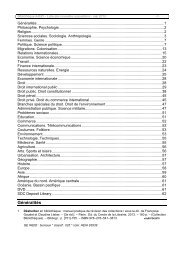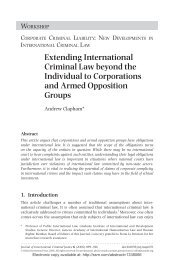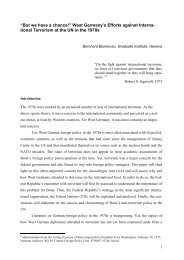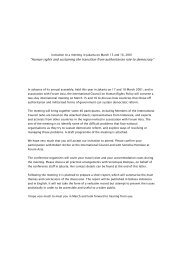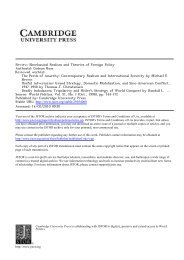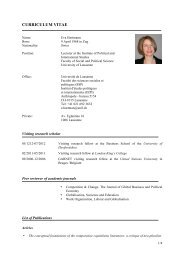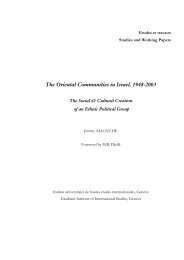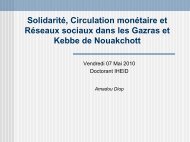Syllabus - The Graduate Institute, Geneva
Syllabus - The Graduate Institute, Geneva
Syllabus - The Graduate Institute, Geneva
You also want an ePaper? Increase the reach of your titles
YUMPU automatically turns print PDFs into web optimized ePapers that Google loves.
Master in International Affairs (MIA)<br />
Academic year 2010 - 2011<br />
Political Economy of the Crisis<br />
IA020 – Spring<br />
6 ECTS<br />
Tuesdays 16:15-18:00 (Rigot 3)<br />
Course Description<br />
<strong>The</strong> forces of globalization – trade and financial liberalization,<br />
political integration and technological change – have led to a<br />
dramatic expansion of the global financial system during the<br />
last two decades. Yet, the crisis that started in August 2007<br />
has brutally reminded us that global economic integration<br />
remains a fragile enterprise as governments can quickly revert<br />
to nationalistic policies under the double pressure of powerful<br />
lobbies and of vocal unions. This class focuses on economic,<br />
political and social forces that have impacted on the unfolding<br />
of the crisis and their long-term consequences on regulation,<br />
the role of states, and inequality.<br />
PROFESSORS<br />
Cédric Dupont<br />
cedric.dupont@graduateinstitut<br />
e.ch<br />
+41 22 908 59 50<br />
Office hours:<br />
Mondays 14h30-16h00<br />
(Rigot 34)<br />
Charles Wyplosz<br />
Charles.wyplosz@graduateinsti<br />
tute.ch<br />
+41 22 908 59<br />
Office hours:<br />
Thursdays 10-12<br />
(Rigot 33)<br />
ASSISTANT<br />
Nell Williams<br />
Nell.williams@graduateinstitute.<br />
ch<br />
+41 22 908 59 51<br />
Office hours:<br />
Tuesdays 13:30-15:30<br />
(Rigot 38)<br />
<strong>Syllabus</strong><br />
Course Website<br />
http://graduateinstitute.ch/political-science/courses/spr-11/political-economy-of-crisis-2011.html<br />
Requirements<br />
Students will be evaluated on the following requirements, each with equal weight in the final grade:<br />
1. One class presentation 15’ maxi, group of two,<br />
2. Final exam (take-home with essay questions) distributed after the last class session and due<br />
within 72 hours;<br />
3. Class participation<br />
Readings<br />
Required<br />
In order to be able to participate in class discussions and to prepare for the exam, students must do a<br />
set of core readings indicated in the course outline below. Given that most core readings are easily<br />
accessible online (for <strong>The</strong> Economist, use EBSCOhome Business via the <strong>Institute</strong>’s library), there is<br />
no reading packet for this course. Chapters from books will be put online (password protected).<br />
INSTITUT DE HAUTES ÉTUDES INTERNATIONALES ET DU DÉVELOPPEMENT<br />
GRADUATE INSTITUTE OF INTERNATIONAL AND DEVELOPMENT STUDIES<br />
SWITZERLAND - TEL +41 (0)22 908 57 00 - http://graduateinstitute.ch
Background and preparation<br />
<strong>The</strong> emphasis of the course is not upon the technical aspects of the operation of financial markets,<br />
but rather upon the evolving political and institutional context in which they operate.<br />
To get an overall picture of the “saga” of the panic between September 2007 and Spring 2009, we<br />
recommend two books:<br />
Wessel, David (2009/10) In Fed We Trust. Ben Bernanke’s War on the Great Panic. New<br />
York: Three Rivers Press [a focus on the role of the Fed and its Chairman]<br />
Sorkin, Andrew Ross (2009/10). Too Big to Fail: Inside the Battle to Save Wall Street. New<br />
York: Penguin. [a thorough chronicle with a focus on the big banks and the Treasury;<br />
reads like a thriller]<br />
For those who may want to refresh their basic understanding of international macroeconomic as well<br />
as get a broader view of the political economy of monetary policy (and its international dimensions)<br />
we list below a few fundamental books as well as a list of useful websites:<br />
Economics – References:<br />
Burda, M. and Wyplosz, C., Macroeconomics, A European Text (Fifth edition).<br />
Krugman, P. and Obstfeld, M. International Economics: <strong>The</strong>ory and Policy (latest edition). especially<br />
parts III and IV.<br />
Economics and International Political Economy – General (selected) Bibliography:<br />
Dicken, Peter 2007. Global Shift: Reshaping the Global Economic Map in the 21 st Century.<br />
London: Sage.<br />
Eichengreen, Barry (1996). Globalizing Capital. Princeton: Princeton University Press.<br />
Eichengreen, Barry (2002). Financial Crises. Oxford: Oxford University Press.<br />
Helleiner, Eric (1994). States and the Reemergence of Global Finance: From Bretton Woods to the<br />
1990s. Ithaca: Cornell University Press.<br />
Ravenhill, John, ed., (2011). Global Political Economy. Oxford: Oxford University Press (3 nd<br />
edition).<br />
Reinhardt, Carmen and Kenneth Rogoff (2009). This Time is Different. Eight Centuries of Financial<br />
Folly. Princeton: Princeton University Press.<br />
Journals:<br />
International Organization; World Politics; <strong>The</strong> World Economy; International Studies Quarterly;<br />
American Political Science Review; Review of International Political Economy (RIPE); Journal of<br />
Economic Perspectives; World Development; Journal of Common Market Studies. Economic Policy;<br />
Foreign Affairs<br />
Newpapers, Magazines:<br />
<strong>The</strong> Economist and Financial Times<br />
For an account of various key moments and some interesting analyses, see the following editions of<br />
<strong>The</strong> Economist:<br />
- Page 2 -
International Organizations:<br />
Students should carefully explore the International Monetary Fund's website<br />
http://www.imf.org/external/index.htm which covers a wide range of information and publications. For<br />
most countries, the IMF now publishes its annual economic reviews or abstracts thereof (Article 4<br />
reviews). With regard to the Asian crisis, the IMF’s May 1998 International Capital Markets reports is<br />
particularly useful.<br />
OECD: for one of the most useful global economic data references, see the OECD's World Economic<br />
Outlook. http://www.oecd.org/<br />
Bank of International Settlements: BIS Annual Report, http://www.bis.org/<br />
National Central Banks:<br />
All national central banks maintain rich websites. In particular, you should look at major monetary<br />
policy speeches by prominent central bankers as well as the most important regular economic<br />
publications of leading central bank (Federal Reserve Bank, European Central Bank, Bank of Japan,<br />
Bank of England, German Bundesbank, Swiss National Bank etc.)<br />
Course content<br />
This class will be co-taught by the two Professors who will always be present together in the room.<br />
Each session will begin by a students’ presentation (no longer than 15 min), followed by a<br />
presentation by one of the two Professors (CD or CW) (no longer than 30 min) and then a general<br />
discussion.<br />
In most sections, the readings are separated in two parts: 1) core readings: those upon which the<br />
presentations could be based and that all students are expected to read before class for discussions;<br />
2) supplements: which may be of use to presenters and that are available for interested students.<br />
When no distinction is mentioned, all readings are core.<br />
I. INTRODUCTORY CLASS: WHAT HAPPENED? [22 February] [CD and CW]<br />
Readings:<br />
Reinhardt, Carmen and Kenneth Rogoff (2009). This Time is Different. Eight Centuries of Financial<br />
Folly. Princeton: Princeton University Press (chap. 1) and pp. 260-273;<br />
Ravenhill, John (2011). “Prologue” in Ravenhill, John, ed., (2011). Global Political Economy. Oxford:<br />
Oxford University Press (3 nd edition).<br />
Wessel, David (2009/10) In Fed We Trust. Ben Bernanke’s War on the Great Panic. New York: Three<br />
Rivers Press; chap. 1<br />
Discussion Questions:<br />
1. <strong>The</strong> crisis initially looked manageable, and then became uncontrollable in many<br />
dimensions. Which ones?<br />
2. Where were key faulty decisions by political authorities?<br />
3. Did the authorities manage the crisis better than in 1929?<br />
- Page 3 -
II.<br />
WHAT WENT WRONG IN THE US MORTGAGE MARKET [29 February] [CW]<br />
Readings (core):<br />
IMF, World Economic Outlook, July 2009, Chapter 1.<br />
Will the Walls Come Falling Down.? <strong>The</strong> Economist, April 20, 2005.<br />
After the Fall, <strong>The</strong> Economist, June 16, 2005.<br />
When it goes Wrong, <strong>The</strong> Economist Sept. 22, 2007<br />
What went wrong (special briefing on Wall Street’s crisis), <strong>The</strong> Economist, March 22, 2008<br />
Readings (supplements):<br />
Brunnermeier, Markus K. 2009. "Deciphering the Liquidity and Credit Crunch 2007-2008." Journal of<br />
Economic Perspectives 23(1): 77-100.<br />
Krishnamurthy, Arvind 2010. "How Debt Markets Have Malfunctioned in the Crisis." Journal of<br />
Economic Perspectives 24(1): 3-28.<br />
Discussion Questions:<br />
1. Who should/could have prevented the housing market price bubble?<br />
2. Are subprime mortgages necessarily a bad idea?<br />
3. Did other countries experience similar problems? Why?<br />
III.<br />
FINANCIAL LIBERALIZATION IN THE US SINCE REAGAN [8 March] [CD]<br />
Readings (core):<br />
Provost, Colin (2010). Another Race to the Bottom? Venue Shopping for Regulators in the American<br />
Financial System. ECPR Dublin on Regulation.<br />
Rosenbluth, Frances and Ross Schaap (2003). <strong>The</strong> Domestic Politics of Banking Regulation,<br />
International Organization 57 (2):<br />
Panitch, Leo and Martijn Konings (2009). Myths of Neoliberal Deregulation. New Left Review 57: 67-<br />
83.<br />
Suarez, Sandra and Robin Kolodny (2010). Paving the Road to “Too Big to Fail”: Business Interests<br />
and the Politics of Financial Deregulation in the U.S. Philadelphia: Temple University.<br />
Readings (supplements):<br />
Peretz, Paul and Jean Reith Schroedel (2009). Financial Regulation in the United States : Lessons<br />
from History. Public Administration Review July/August : 603-612.<br />
Ferguson, Thomas and Robert Johnson (2009). Too Big to Bail. Part I : From Shadow Financial<br />
System to Shadow Bailout. International Journal of Political Economy 38(1) [read pp. 11-21]<br />
- Page 4 -
Discussion Questions:<br />
1. Was there an excessive “deregulation” of finance in the US that conducted to the crisis?<br />
2. Who are the big players in the regulatory dynamics in finance?<br />
3. Was there anything new (or specific to the US) in the US financial regulation in the late 20 th<br />
century and early 21 st century?<br />
IV.<br />
THE TRANSMISSION OF THE CRISIS TO EUROPE [15 March] [CW]<br />
Readings (core):<br />
European Commission (2010) “<strong>The</strong> EU's response to support the real economy during the economic<br />
crisis: An overview of Member States' recovery measures”, European Economy Occasional Paper No.<br />
51, p. 10-30.<br />
European Commission (2009) Quarterly Report of the Euro Area 8(2), p. 5-13.<br />
Readings (supplements):<br />
International Monetary Fund (2009) World Economic Outlook, October. [Select parts concerning<br />
Europe.]<br />
International Monetary Fund (2009) World Economic Outlook, October. [Select parts concerning<br />
Europe.]<br />
Hardie, Iain and David Howarth (2009). Die Krise but La Crise? <strong>The</strong> Financial crisis and the<br />
transformation of German and Banking Systems. Journal of Common Market Studies 47(5):1017-<br />
1039.<br />
Discussion Questions:<br />
1. <strong>The</strong> first signal of the upcoming crisis was given by BNP-Paribas. Why ever?<br />
2. Why did Europe get hit at all?<br />
3. Europe seems to have suffered as much as the US. Is this a paradox?<br />
V<br />
THE GLOBAL LIBERALIZATION WAVE [22 March] [CD]<br />
Readings (core):<br />
Wyplosz, Charles (2002) “How Risky is Financial Liberalization in the Developing Countries?”<br />
Comparative Economic Studies, June.<br />
Kaminsky, Graciela and Sergio L. Schmukler (2007) “Short-Run Pain, Long-Run Gain: Financial<br />
Liberalization and Stock Markets Cycles”, George Washington University.<br />
Deeg, Richard and Mary O'Sullivan 2009. "<strong>The</strong> Political Economy of Global Finance Capital." World<br />
Politics 61(4): 731-763.<br />
- Page 5 -
Readings (supplements):<br />
Williamson, Jeffrey G. 2007. "Global Capital Markets in the Long Run." Journal of Economic Literature<br />
XLV(June): 400-409.<br />
Reinhardt, Carmen and Kenneth Rogoff (2009). This Time is Different. Eight Centuries of Financial<br />
Folly. Princeton: Princeton University Press<br />
Discussion Questions:<br />
1. How has the world become financially global?<br />
2. How have countries and markets dealt with risk in such a world?<br />
3. Are all crises potentially global?<br />
VI.<br />
THE TRANSMISSION OF THE CRISIS TO EMERGING MARKET COUNTRIES [29 March]<br />
[CW]<br />
Readings (core):<br />
International Monetary Fund (2009) World Economic Outlook, Chapter 4.<br />
Reinhardt, Carmen and Kenneth Rogoff (2009). This Time is Different. Eight Centuries of Financial<br />
Folly. Princeton: Princeton University Press, chap. 15.<br />
Domino <strong>The</strong>ory, <strong>The</strong> Economist, Feb. 28, 2009<br />
Readings (supplements):<br />
1) International Monetary Fund (2010) World Economic Outlook, April. [Select parts concerning<br />
emerging market economies.]<br />
2) Berkmen, Pelin, Gaston Gelos, Robert Rennhack, and James P. Walsh (2009 ”<strong>The</strong> Global<br />
Financial Crisis: Explaining Cross-Country Differences in the Output Impact”, IMF Working Paper<br />
WP 09/280. [Technical but just read the results.]<br />
Discussion Questions:<br />
1. How was the crisis transmitted to emerging market economies?<br />
2. Why did the emerging market economies recover so fast?<br />
3. Is the dual-track recovery a symbol of the new world economy?<br />
VII.<br />
MACROECONOMIC POLICY RESPONSES [5 April] [CW]<br />
Readings (core):<br />
IMF (2009) Global economy beyond the crisis, Staff Note to the G20.<br />
Romer, Christina (2009) “<strong>The</strong> lessons of 1937”. <strong>The</strong> Economist, June 18.<br />
- Page 6 -
European Commission (2009) “<strong>The</strong> EU’s responses to support the real economy during the economic<br />
crisis”, European Economy Occasional Papers 511.<br />
Akerlof, George A. and Robert J. Shiller (2009). Animal Spirits. How Human Psychology Drives the<br />
Economy, and Why it Matters for Global Capitalism. Princeton: Princeton University Press. Chap. 7<br />
(Why Do Central Bankers Have Power over the Economy) and Postcript to Chap. 7 (<strong>The</strong> current<br />
financial Crisis: What is to be Done)<br />
Readings (supplement material)<br />
Testimony of Mervyn King, Governor the Bank of England.<br />
Blanchard, Olivier (2009) (Nearly) Nothing to Fear but Fear Itself, <strong>The</strong> Economist, January 29, 2009.<br />
<strong>The</strong> Monetary-Policy Maze, <strong>The</strong> Economist, April 25, 2009<br />
Discussion Questions:<br />
1. Why are the 2010s unlikely to be like the 1930s?<br />
2. What did governments do?<br />
3. What did central banks do?<br />
VIII.<br />
SAVING BIG BANKS [12 April] [CD]<br />
Readings (core):<br />
IMF (2009) “Global economic policies and prospects”, Staff notes to the G20, p.11-14.<br />
Ferguson, Thomas and Robert Johnson (2009). Too Big to Bail. Part II : Fatal Reversal – Single<br />
Payer and Back. International Journal of Political Economy 38(2) : 5-45<br />
Wessel, David (2009/10). In Fed We Trust. Chap 10 (Fannie, Freddie and Feddie), Chap. 11<br />
(Breaking the Glass) and 12 (Socialism with American Characteristics).<br />
Wyplosz, Charles (2008) “Public interventions in presence of acute financial distress”, Briefing Note to<br />
the Committee for Economic and Financial Affairs of the European Parliament.<br />
End of Illusions, <strong>The</strong> Economist, July 19, 2008<br />
Kenneth Rogoff (2008), “<strong>The</strong> world cannot grow its way out of this slowdown”, <strong>The</strong> Economist, July<br />
29, 2008.<br />
“Hall of shame”, <strong>The</strong> Economist, August 7, 2008.<br />
Wall Street’s Bad Dream (special report), <strong>The</strong> Economist, Sept. 20, 2008<br />
I Want Your Money, <strong>The</strong> Economist, Sept. 20, 2008<br />
<strong>The</strong> Bailiff, <strong>The</strong> Economist, Oct. 11, 2008<br />
Big Government Fights Back, Jan. 31, 2009<br />
- Page 7 -
Dashed expectations, <strong>The</strong> Economist, Feb. 14, 2009<br />
<strong>The</strong> Curse of Politics, <strong>The</strong> Economist, April 16, 2009.<br />
Readings (supplements):<br />
IMF (2009) Global Financial Stability Report, October, Ch. 3.<br />
European Commission (2009) Quarterly Report on the Euro Area 8(2), p.14-20.<br />
Sorkin, Andrew Ross (2009/10). Too Big to Fail: Inside the Battle to Save Wall Street. Chap. 14 &15<br />
(on Lehman) and 19&20 (on TARP and capital injection in big banks).<br />
Bulow, Jeremy and Paul Klemperer (2009) “Reorganizing the banks: Focus on the liabilities, not the<br />
assets”, VoxEU.<br />
Discussion Questions:<br />
1. Should governments have saved banks? All of them?<br />
2. Do banks have an incentive to take too much risk?<br />
3. Should bankers be personally punished?<br />
IX.<br />
THE EUROPEAN DEBT CRISIS [19 April] [CW]<br />
Readings (core):<br />
De Grauwe, Paul 2010. "Crisis in the Eurozone and how to deal with it." CEPS Policy Brief 204.<br />
Wyplosz, Charles (2010) “High deficits and debts”, Briefing Note to the Committee for Economic and<br />
Financial Affairs of the European Parliament.<br />
Wyplosz, Charles (2010) “<strong>The</strong> Eurozone debt crisis: facts and myths”, VoxEU.<br />
Eichengreen, Barry (2010) “Europe’s Historic Gamble”, Project Syndicate.<br />
Tony Barber (2010) “<strong>The</strong> euro: Dinner on the edge of the abyss”, Financial Times, October 10.<br />
Readings (supplement material)<br />
Pisani-Ferry, Jean 2010. "Euro-Area Governance: What Went Wrong? How to Repair it?" Bruegel<br />
Policy Contribution 2010/05.<br />
Gros, Daniel 2010. "Adjustment Difficulties in the GIPSY Club." CEPS Working Document 326.<br />
Lannoo, Karel 2010. "Europe 2020 and the Financial System: Smalller is Beautiful." CEPS Policy<br />
Brief 211.<br />
- Page 8 -
Discussion Questions:<br />
1. Why did the crisis hit (so far) only Euro Area countries?<br />
2. What were the alternatives open to the authorities?<br />
3. Are the bailouts of Greece and Ireland a sign of enhanced solidarity?<br />
X. GREECE AND AUSTERITY [3 May] [CD]<br />
Readings (core):<br />
European Commission (2010) “<strong>The</strong> economic adjustment programme for Greece”, European<br />
Economy Occasional Papers No. 61.<br />
IMF, “Greece: Second Review”, December 2010.<br />
Krugman, Paul (2010) “Greek endgame” New York Times, May 5, 2010.<br />
“Papandreaou tries to prop up the pillars”, <strong>The</strong> Economist, December 17, 2009.<br />
“<strong>The</strong> end of the party”, <strong>The</strong> Economist, May 5, 2010.<br />
“Repayment days”, <strong>The</strong> Economist, February 3, 2011.<br />
Thomas, Landon Jr. (2011) What’s broken in Greece? Ask an entrepreneur”, New York Times,<br />
January 29, 2011.<br />
Readings (supplement material):<br />
IMF, “Stand-by agreement”, May 2010.<br />
European Commission (2011). “<strong>The</strong> Economic adjustment programme for Ireland”, European<br />
Economy Occasional Papers No. 76 (parts V.3 and V.4)<br />
Burgoon, Brian (2009). "Globalization and backlash: Polayni's revenge?" Review of International<br />
Political Economy 16(2): 145-177<br />
Discussion Questions:<br />
1. Has Greece a chance of delivering on its promises?<br />
2. Is the austerity package socially fair?<br />
3. Is Greek sovereignty trampled upon?<br />
- Page 9 -
XI.<br />
ECONOMICS OF FINANCIAL MARKET REGULATION [10 May] [CW]<br />
Readings (core):<br />
Basel Committee on Banking Supervision, “Group of Governors and Heads of Supervision announces<br />
higher minimum capital standards”, Press release, September 2010.<br />
<strong>The</strong> Economist, “Taming the banks” and “Basel’s buttress”, September 16, 2010.<br />
<strong>The</strong> Economist, “<strong>The</strong> great unknown”, January 13, 2011.<br />
Acharya, Viral et al. (2010) “A critical assessment of the Dodd-Frank Wall Street reform and<br />
Consumer Protection Act”, Vox EU.<br />
Goohart, Charles and Dimitri Tsomocos (2009) “Liquidity, default, and market regulation”, VoxEU.<br />
Readings (supplements):<br />
Rajan, Raguram (2010) “A Better Way to Curb Size”, Financial Times.<br />
Walter, Andrew (2010). Global regulatory norms after the crisis: <strong>The</strong> case of China and Basel<br />
standards. ECPR annual workshop paper.<br />
Discussion Questions:<br />
1. Why banks need to be regulated?<br />
2. How to deal with banks too big to fail?<br />
3. Are markets poorly regulated and supervised?<br />
XII. POLITICS OF FINANCIAL MARKET REGULATION: DOMESTIC AND EUROPEAN<br />
DYNAMICS [17 May] [CD]<br />
Readings:<br />
Levine, Ross (2010). <strong>The</strong> governance of financial regulation: reform lessons from the recent crisis.<br />
BIS Working Paper 329.<br />
Taming Finance by Empowering Regulators. A Survey of Policies, Politics and Possibilities (2010).<br />
UNDP<br />
<strong>The</strong> Regulatory Rumble Begins, <strong>The</strong> Economist, May 30, 2009<br />
Readings (supplements):<br />
Donnelly, Shawn (2010). Surpassing Network Governance? European Financial Market Regulation<br />
after the financial crisis.<br />
Pesendorfer, Dieter (2010). Overcoming Systemic Financial Risks in Europe: Contested Policy<br />
Responses<br />
Bernauer, Thomas and Vally Koubi (2006). On the interconnectedness of regulatory policy and<br />
- Page 10 -
markets: Lessons from Banking, British Journal of Political Science, 36: 509-525.<br />
Discussion Questions:<br />
1. How can we explain domestic differences in regulatory systems?<br />
2. Who is the principal and who is the agent?<br />
3. Has anything changed in the politics of regulation after the crisis?<br />
XIII. POLITICS OF INTERNATIONAL FINANCIAL MARKET REGULATION: INTERNATIONAL<br />
COOPERATION AND DELEGATION [24 May] [CD]<br />
Readings:<br />
Helleiner, Eric (2010). What Role for the New Financial Stability Board? <strong>The</strong> Politics of International<br />
Standards after the Crisis. Global Policy 1(3): 282-290<br />
Arner, Douglas and Michael Taylor (2009). `<strong>The</strong> Global Financial Crisis and the Financial Stability<br />
Board: Hardening the Soft Law of International Financial Regulation?’ Asian <strong>Institute</strong> of International<br />
Financial Law Working Paper no. 6.<br />
Rodrik, Dani (2009). A Plan B for Global Finance, <strong>The</strong> Economist, March 14, 2009<br />
Kapstein, Ethan (2006). Architects of Stability? International Cooperation among financial supervisors.<br />
BIS Working paper 199.<br />
Readings (supplements):<br />
Levinson, Marc 2010. "Faulty Basel: Why More Diplomacy Won't Keep the Financial System Safe."<br />
Foreign Affairs 89(3).<br />
Rottier, Stéphane and Nicolas Véron (2010). "Not All Financial Regulation is Global." Bruegel Policy<br />
Brief 2010/07.<br />
White, Lawrence J. (2010). "<strong>The</strong> Credit Rating Agencies." Journal of Economic Perspectives 24(2):<br />
211-226.<br />
Hildebrand, Philipp (2009) “Necessary Changes for a Sounder Financial System”, Swiss National<br />
Bank.<br />
Pauly, Louis (2009). "<strong>The</strong> Old and the New Politics of International Financial Stability." Journal of<br />
Common Market Studies 47(5): 955-975<br />
Discussion Questions:<br />
1. What role for international agencies or bodies?<br />
2. What role for private actors, in particular the credit agencies?<br />
3. How can domestic and international regulatory dynamics complement each other?<br />
- Page 11 -
XIV.<br />
HOW THE WORLD HAS CHANGED [31 May] [CD AND CW]<br />
Readings:<br />
Eichengreen, Barry (2009) “<strong>The</strong> Last Temptation of Risk”, <strong>The</strong> National Interest, May-June, p. 1-7.<br />
Xinbo, Wu (2010). Understanding the Geopolitical Implications of the Global Financial Crisis. <strong>The</strong><br />
Washington Quarterly 33(4): 155-163.<br />
Wyplosz, Charles (2010) “<strong>The</strong> dollar is the worst international currency, except for all others”, What<br />
Matters, McKinsey & Co.<br />
Rajan, Raguram (2010) “Why Did Economists Not Foresee the Crisis?”, Project Syndicate.<br />
Ferguson, Niall (2009). <strong>The</strong> Ascent of Money. A Financial History of the World. New York: Penguin,<br />
Afterword: <strong>The</strong> Descent of Money, pp. 342-362<br />
Readings (supplements):<br />
Altman, Roger C. (2009). "Globalization in Retreat: Further Geopolitical Consequences of the<br />
Financial Crisis." Foreign Affairs 88(4): 2-8.<br />
Woods, Ngaire (2010). Global Governance after the Financial Crisis: A New Multilateralism or the<br />
Last Gasp of the Great Powers? Global Policy 1(1): 51-63.<br />
International Monetary Fund (2011) “<strong>The</strong> world still needs to fix key financial, economic problems”,<br />
IMF Survey Magazine, January 25.<br />
Overholt, William H. (2010). China in the Global Financial Crisis: Rising Influence, Rising Challenges.<br />
<strong>The</strong> Washington Quarterly 33(1): 21-34<br />
Discussion Questions:<br />
1. Is the crisis an indictment of capitalism?<br />
2. Is the crisis an indictment of globalization?<br />
3. What would you expect to be permanently changed by the crisis?<br />
- Page 12 -


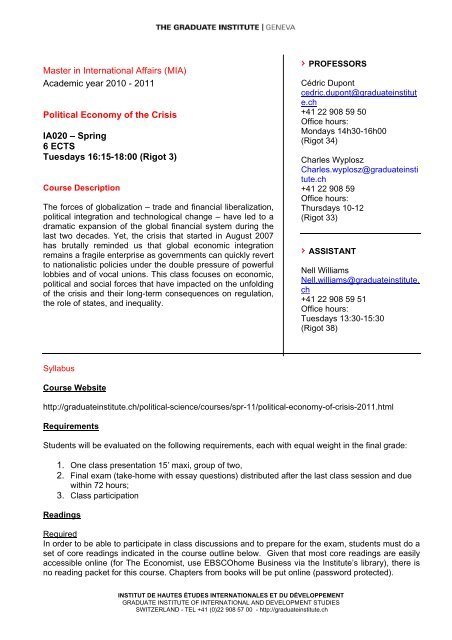
![Download [pdf] - The Graduate Institute, Geneva](https://img.yumpu.com/23370020/1/190x248/download-pdf-the-graduate-institute-geneva.jpg?quality=85)
